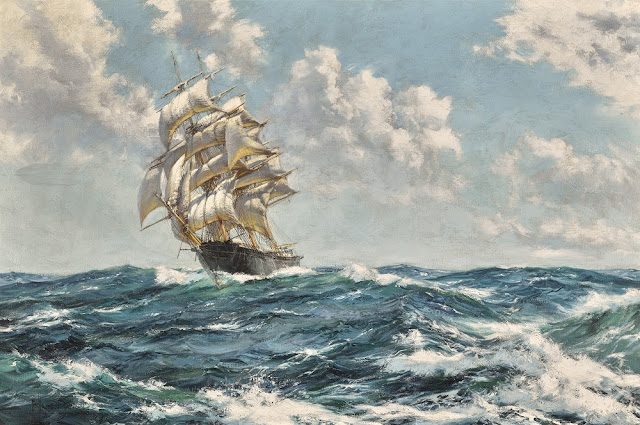Montague Dawson, RMSA, FRSA (1890–1973)
GLEAMING FOAM, CHARIOT OF FAME
Oil on canvas
61 by 91.5cm., 24 by 36in
Private collection
Chariot of Fame, a handsome clipper of 1639 tons built in America and flying the flag of the famous White Star Company. She had excellent accommodation for passengers, and before she was chartered by the Government to bring troops out to New Zealand to quell the Maori disturbances she had been in the Australian trade. She made several smart passages while in that trade, and on one occasion she did the run from London to Melbourne in 67 days.
the Chariot of Fame arrived in Auckland on January 8, 1864, under command of Captain Clark. After an uneventful passage of 92 days she landed 520 rank and file of the 58th, 70th, 18th, 40th, 57th, and 65th Regiments, and 64 women and 67 children. Many of these men were killed in the Waikato war. During the passage out a private of the 70th was washed overboard and drowned, and there were eight deaths—one adult and seven children.
The year before she was at Auckland the Chariot of Fame visited Lyttelton, where she arrived on January 29, 1863, with 460 passengers, of whom 430 were Government immigrants. She left London on October 29, 1862, and notwith-standing a detention of several days in the Channel she sighted the Snares on the eighty-first day out. On the coast she was further delayed by light winds and calms, and did not reach her destination until the ninety-second day out from the docks. More on Chariot of Fame
It is said that she came to her end in January, 1876, being abandoned when bound from Chincha Islands to Cork.
Montague Dawson RMSA, FRSA (1890–1973) was a British
painter who was renowned as a maritime artist. His most famous paintings depict
sailing ships, usually clippers or warships of the 18th and 19th centuries.
Montague was the son of a keen yachtsman and the grandson of the marine painter
Henry Dawson (1811–1878), born
in Chiswick, London. Much of his childhood was spent on Southampton Water where
he was able to indulge his interest in the study of ships. For a brief period
around 1910 Dawson worked for a commercial art studio in Bedford Row, London,
but with the outbreak of the First World War he joined the Royal Navy. Whilst
serving with the Navy in Falmouth he met Charles Napier Hemy (1841–1917), who considerably influenced his
work. In 1924 Dawson was the official artist for an Expedition to the South
Seas by the steam yacht St.George. During the expedition he provided
illustrated reports to the Graphic magazine.
After the
War, Dawson established himself as a professional marine artist, concentrating
on historical subjects and portraits of deep-water sailing ships. During the
Second World War, he was employed as a war artist. Dawson exhibited regularly
at the Royal Society of Marine Artists, of which he became a member, from 1946
to 1964, and occasionally at the Royal Academy between 1917 and 1936. By the
1930s he was considered one of the greatest living marine artists, whose
patrons included two American Presidents, Dwight D Eisenhower and Lyndon B
Johnson, as well as the British Royal Family. Also in the 1930s, he moved to
Milford-Upon-Sea in Hampshire, living there for many years. Dawson is noted for
the strict accuracy in the nautical detail of his paintings which often sell
for six figures.
The work of Montague Dawson is represented in
the National Maritime Museum, Greenwich and the Royal Naval Museum, Portsmouth. More on
Montague Dawson
Please note that the content of this post primarily consists of articles available from Wikipedia or other free sources online.
Portrait
of a Lady, The
Orientalist, Art of the Nude and The
Canals of Venice, And
visit my Boards on Pinterest
Images are copyright of their
respective owners, assignees or others. Some Images may be subject to copyright
I don't own any of these images -
credit is always given when due unless it is unknown to me. if I post your
images without your permission, please tell me.
I do not sell art, art prints, framed
posters or reproductions. Ads are shown only to compensate the hosting
expenses.
If you enjoyed this post, please share
with friends and family.
Thank you for visiting my blog and also
for liking its posts and pages.
Please note that the content of this post primarily consists of articles available from Wikipedia or other free sources online.



%20William%20Scarbrough's%20Unloading,%20Pool%20of%20London.jpeg)
